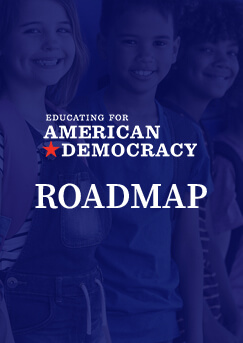The curated resources linked below are an initial sample of the resources coming from a collaborative and rigorous review process with the EAD Content Curation Task Force.
 Reset All
Reset All
Do Americans have shared ideals? What do they look like? Students investigate this question by closely examining words that express American ideals, selecting images from a provided deck that best illustrate their interpretation of the word, and them comparing their choices to others in their group.

The Roadmap



Smithsonian National Museum of American History


What does it mean to be a good citizen? Students investigate this question by looking at the Naturalization Oath of Allegiance, which foreign-born people must take to become naturalized American citizens, and thinking deeply about what are or should be crucial requirements of citizenship. This lesson guides students to closely examine information, to ask probing questions, and to take part in complex discussions with classmates.

The Roadmap



Smithsonian National Museum of American History


Maps, truth, and belief have a complicated relationship with one another. Every map is a representation of reality, and every representation, no matter how accurate and honest, involves simplification, symbolization, and selective attention.

The Roadmap



Norman B. Leventhal Map & Education Center


The American ability to inspire--which we call exceptionalism--is not automatic. It takes continued efforts to be realized in a changing world. In this series, scholars at the Hoover Institution--professors, thinkers, and practitioners of global renown in their respective fields--offer a series of accessible policy ideas for civic, economic, and security architecture that would shore up the long-term foundations of American strengths.

The Roadmap



Hoover Institution


An open access e-Book for upper elementary, middle and high school teachers and students, "Building Democracy for All: Interactive Explorations for Government and Civic Life" presents an interactive, multimodal, and multicultural exploration of key topics in United States government and civic life.

The Roadmap




College of Education, University of Massachusetts Amherst


Is the Electoral College antidemocratic? The Founders rejected the direct election of the president in order to balance individual liberty against majority rule. In addition, the Electoral College encourages candidates to widen their campaigns and reach out to voters across the nation, leading to less partisanship. In this lesson, students will investigate the how the Electoral College functions and arguments both for and against it.

The Roadmap

Hoover Institution


Discover what it takes to become an informed voter — from knowing where you stand on important issues to uncovering what you need to know about candidates.

The Roadmap

iCivics, Inc.


This collection of resources includes free K-12 civic education lessons, activities, blogs and webinars to help with educating students on the election. Additional topics include fostering civil discourse, fighting fake news, voting rights and debate ideas to keep students informed and engaged.

The Roadmap




AFT Share My Lesson


Based on research with professional fact checkers, the Civic Online Reasoning curriculum helps students become better evaluators of online information.

The Roadmap



Stanford History Education Group


Students examine how confirmation bias operates and its influence on how we process information. Students explore why it can be difficult for people to accept information that challenges their beliefs. Students then identify ways to keep their confirmation bias in check.
High Resolves


In this lesson plan, students learn about confirmation bias and motivated reasoning with the help of a "Psychology Today" article, then apply their knowledge by reading opposing articles about school start times.

The Roadmap




NewseumED


Uncover the tools to hold constitutional conversations and civil dialogue.

The Roadmap


National Constitution Center





